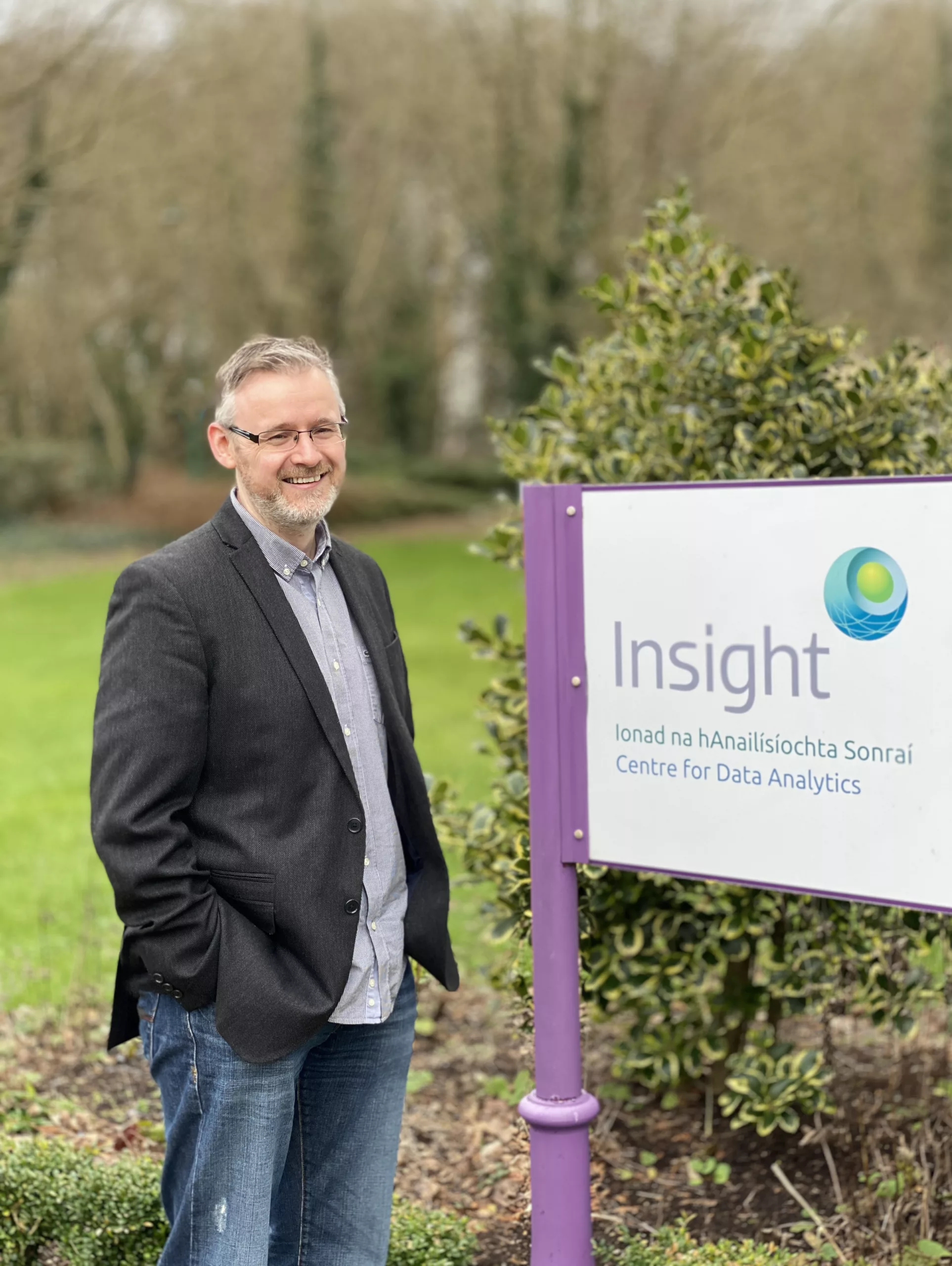
In 2003 the Irish research landscape was disrupted by the establishment of Science Foundation Ireland (SFI). For the first time, Ireland had a research agency capable of funding world-leading research endeavours. One of the first programmes from SFI was the Centre for Science, Engineering and Technology (CSET), a place to bring together scientists and engineers to work on fundamental problems relevant to Irish Society and Economy. (1) In 2013 the Insight SFI Research Centre for Data Analytics was established by combining four existing centres operating in the space: DERI (NUI Galway), Clarity (UCD/DCU), TRILL(UCD), 4C (UCC) and the CLIQUE research cluster (UCD) with €75m funded by SFI and over 450 researchers. Today Insight is one of Europe’s largest data analytics research centres, developing world-leading technologies in semantics. So, what is semantics and why is this significant in an AI-driven future?
What is Semantics?
At the core of the work undertaken by Insight (formerly DERI) at the University of Galway is the investigation of semantics in modern computing systems. The study of semantics is concerned with the analysis and interpretation of large collections of unstructured textual and other data. Without semantics, humans are tasked with providing interpretations for the meaningless characters and strings (syntax) processed by computers. Semantics infuses computers with the ability to add meaning to these characters and strings. In simple terms, semantics attaches meanings and relationships to words and other data used in computing systems.
The study of semantics is vital to every aspect of our increasingly digital world, where ambiguous data is at the core of the tools we use and the decisions we make. To use tools correctly and make the right decisions, the underlying data must be interpreted correctly and given its correct meaning. This is imperative in creating a transparent and trustworthy digital space.
Made in Galway: Pioneers in Semantic Technologies with Global Impact
Galway has made significant contributions to the advancement of semantic technologies, from the definition of formal models for semantic data representation to the automatic extraction of metadata from unstructured, textual and/or visual data. Galway is pioneering in techniques for creating, searching and reasoning over ‘knowledge graphs’ and the scientific study of hybrid ‘neuro-symbolic’ AI methods. The latter of which combine formal models for semantic data representation and latent semantic space. Notably, we have been at the leading edge of these technologies, from the Internet of Things, Social Computing, and Natural Language Processing to eGovernment, Sustainability and Digital Health and Life Sciences.
Galway has a strong track record in standardisation efforts, defining many core formal models (also referred to as ‘ontologies’ or ‘vocabularies’) for semantic data representation widely used in publishing, sharing and linking of data on the web – endorsed by World Wide Web Consortium (W3C) standards.
Over the last 20 years, Galway has excelled as a scientific leader in semantics and related areas. (1) Insight and its predecessor DERI have attracted €120M+ funding to Galway and Insight has contributed €1.1bn value to the Irish economy. (2) From a global standpoint, we have been at the heart of the European data and AI ecosystems and have strengthened global competitiveness and European leadership through the design and creation of two triple-helix European Partnerships. (3) Once completed, these partnerships will have stimulated €4.8B+ of private investment directly supporting knowledge transfer, new products and job creation across Europe. During this time, we have been fortunate to name among our industrial research collaborations: Fidelity, Huawei, Amazon, Cisco, IBM, Fujitsu, Boston Scientific, Storm Technologies, Orreco, Medtronic, Hewlett Packard, Genesys and Schneider Electric – to mention a few.
Influencing Change Through Research and Education
While semantic technology rarely enters public discourse, the ripples of change created by these advancements are far reaching, whether that’s building resilient global supply chains, developing AI or managing a building’s energy consumption. Our research has heavily influenced government and the public sector from the Obama Administration using our technology in their government data portal, to the von der Leyen Commission including our data spaces at the core of the European Data Strategy. Our Semantic technologies are deployed in Open Data Portals around the world, and we were at the core of developing the (open) data ecosystem in Ireland and Europe that enables data-driven innovation in all sectors of the economy and empowers citizens to contribute to policies and make better-informed decisions.
We have contributed to national challenges, including responding to COVID with simulation and data governance expertise to the Irish Epidemiological Modelling Advisory Group (IEMAG) and restoring our native peatlands. It is important to us that Insight as a national capability is ready and able to respond when called upon. Since 2003, nearly 1000 students and staff have passed through our doors, moving into leadership positions in industry, research, national government and the European Commission. It has been inspiring to see the success of our alumni in spin-out companies and start-ups such as Siren.io, Peracton, Derilinx and Lua Health.
A Digital Society: What Does The Future Look Like?
The University of Galway remains at the vanguard of next-generation semantic technologies, including the improvement of neural networks by use of neuro-symbolic approaches to AI, enabling better accountability, interpretation and explainability. While still important, efficiency is no longer the top priority in data processing. Increasingly, we are focusing on using the right data in the right way, with transparency and accountability, in service of the public good.
Building on our core values of respect, excellence and openness, we will persist at the centre of the European Data and AI Ecosystem, implementing the European Commission’s Data Strategy and Common European Data Spaces. We will drive the transition to a digital society in Europe and ensure that this is a future in service of innovation, health and wellbeing.
Profiles

Edward Curry is the Established Professor of Data Science and Director of the Insight SFI Research Centre for Data Analytics and Data Science Institute at the University of Galway. Edward has made substantial contributions to semantic technologies, incremental data management, event processing middleware, software engineering, and distributed systems and information systems. The impact of his research has been acknowledged by numerous awards, including best paper awards and the University of Galway President’s Award for Societal Impact in 2017.
He is organiser and programme co-chair of major international conferences, including CIKM 2020, ECML 2018, IEEE Big Data Congress, and European Big Data Value Forum. Edward is co-founder and elected Vice President of the Big Data Value Association (BDVA) and the AI, Data and Robotics Association (Adra).

Paul Buitelaar is Professor in Data Analytics and Deputy Director of the Data Science Institute at the University of Galway where he leads a team in Natural Language Processing. He is Co-Director of the SFI Centre for Research Training in AI and Co-PI of the Insight SFI Research Centre for Data Analytics. His research interests are in the development and use of Natural Language Processing methods for knowledge extraction and semantic-based information access.
He has been involved in a large number of national and international funded projects in this area, among which the EU funded projects: Monnet, MixedEmotions, Pret-a-LLOD and Pandem-2. He has further been the originator and lead on the development of the Saffron framework for knowledge extraction from text, which has been used in projects with the Irish Times, Fidelity Investments and Huawei.